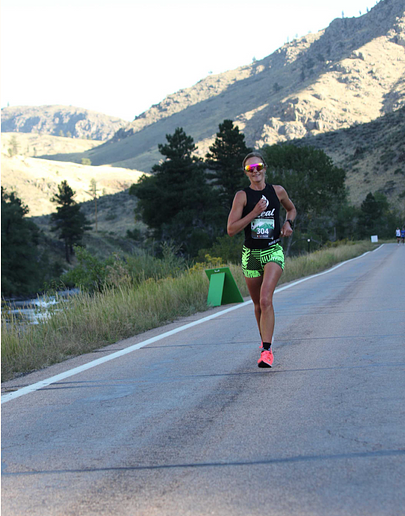Mon 18 Sep 2023•Dana Eshelman MS• RDN• CSSD• METS
Altitude Training + Nutrition

Boulderthon's altitude is over 5,000 feet above sea level! If you're coming from out of town, it's important to take care of your body and make some adjustments to be race-ready!
What Happens to Your Body When You Adapt to Training at Altitude?
There are physiological adaptations that happen at altitude that are beneficial for endurance, high intensity team sports, and anaerobic sports. Benefits of acclimatization include:
-
Increased oxygen capacity of blood by way of increased production of red blood cells. RBCs carry oxygen; meaning, the more RBCs you have, the more oxygen your muscles receive while doing work.
-
Increased oxygen utilization in muscles meaning increased VO2 max (or increased aerobic capacity).
-
Increased formation of new blood vessels
-
Increased pH regulation (aka increased lactate threshold) = increased exercise tolerance
-
Decreased heart rate
-
Increased red blood cell (RBC) volume 10-14 days after leaving altitude.
-
Elevated metabolic rate by 2.5 to 3 times that at sea level
Keep in mind it can take 2-3 weeks training at altitude to fully acclimate, so unless you're planning on coming to Boulder weeks ahead of the event, you won't be able to benefit from these adaptations. However, there are several measures you can take before and during your trip to help you feel ready on race morning!
Prepare Ahead For Altitude
-
Well rested and healthy going into week(s) at altitude. Altitude can affect your body's ability to get into deep sleep, thus can affect recovery.
-
Aim for optimal iron status as an athlete before going to elevation. Iron (hemoglobin) carries oxygen within red blood cells in the blood. With lower oxygen at altitude, increases red blood cell production and downregulates hepcidin (regulator of iron metabolism).
-
Understand total calorie needs and carb intake for altitude. You may need 10 to 20% additional total calories from your baseline when going to altitude.
-
Manage training load by decreasing intensity the first 72 hours at altitude. It can take 3-5 days for your body to begin producing more erythropoietin (hormone signaling the production of red blood cells). Remember, red blood cells carry oxygen, so with lower red blood cell volume, you will feel more tired and have a more difficult time exerting yourself. Keep in mind it can take 2-3 weeks training at altitude to fully acclimate.
Tips for traveling to altitude:
-
Stay hydrated! Sip regularly. Do not wait until thirsty for the first 72 hours at altitude. You can monitor your hydration status by:
-
weighing yourself before and after workouts
-
checking the color of your urine -- aim for a lemonade color
-
bathroom frequency
-
-
Check iron status 6 weeks before going to altitude and correct deficiency as needed
-
Optimal ferritin 40-80 ng/ml
-
Increase iron rich foods - lean beef, oysters, tuna, lentils, beans, tofu, fortified cereal
-
-
Optimize immune health.
-
Eating a rainbow of fruits and veggies! The various colors of produce provide your body with different antioxidants that help your body fight inflammation and infection. These guys are also great for your gut.
-
Include fiber-rich whole grains such as:
-
Brown or wild rice
-
Oats
-
Quinoa
-
Whole grain breads, pastas, tortillas, crackers and cereals
-
-
Choose probiotic rich foods including:
-
Plain greek yogurt and kefir
-
Cottage cheese
-
Fermented veggies (ie pickles, onions, sauerkraut, kimchi)
-
Miso soup
-
Fermented soy beans
-
-
Sleep 7-9 hours/night
-
-
Support increased metabolism with regular feedings with a performance plate (protein, fat, carb + color) every 2-4 hours. You may try monitoring your body weight if training at altitude longer than a week to ensure you are maintaining weight +/- 2 pounds if this is your goal. Some examples
-
Loaded oats: ½ to 1 c oatmeal + ¼ c almonds + 1 T maple syrup + ½ c greek yogurt
-
Glow bowl: 4-5 oz shredded chicken + 1 medium sweet potato + ¼ c white beans + ½ c quinoa + ¼ c pesto + 1 c kale, mushroom, onion
-
Tofu scramble: 4 oz tofu + 1 c broccoli, onion, bell pepper + ½ c beans with side of ½ c oatmeal + fruit
-
-
Optimize that sleep schedule of 7 to 9 hours per night
-
Foods to help with sleep include: tart cherry, whole grains, nuts, herbal tea, lean meat
-
Foods that negatively affect sleep/ foods to limit include caffeine, alcohol, fried foods
-
We are so excited for you to challenge yourself at altitude and have a wonderful day at Boulderthon!

AUTHOR
Dana Eshelman MS, RDN, CSSD, METS
Dana is a Registered Dietitian Nutritionist (RDN) and has been in the nutrition world, professionally, for 5 years.Nutrition has a special place in her heart and has impacted her on a personal level as a female athlete. From a young age, she committed to understanding the power of nutrition on health, longevity, and performance.Dana received her Bachelors of Science in Nutrition and Dietetics with minors in gerontology and sports nutrition from the University of Colorado Colorado Springs in 2015. She completed her national board exam to become a RD/RDN in 2016. During her time as a clinical dietitian, she went on to get her Masters of Science in Nutrition and Human Performance from Logan University in 2019.As of August 2022, she received her level 1 certification as metabolic efficiency training specialist (METS I). Metabolic efficiency is a process of improving the body's ability to utilize energy stores more efficiently through nutrition and exercise.In December 2022, She passed her board certified specialist in sports dietetics (CSSD). This expanded her knowledge in working with athletes, so she can provide up to date, evidence - based practice to her athletes!In her free time, Dana loves spending time with her boyfriend and biggest life supporter, Corey, and their dog, Nala. She is a runner at heart and recently took up triathlon, which she has developed a deep passion for. She also enjoys resistance/ weight training, cooking, hiking, and being on the water in any form (kayak, paddle board, boat, swimming).Her philosophy in nutrition goes far beyond the food you put into your body. Together, she want to understand how food affects you, how it makes you feel, and what it does for you. Nutrition is all about supporting the complex systems that make up your body and listening to what your body needs so you can take on all that you ask your body to achieve.Fueled is fast, friends!
 0
0
